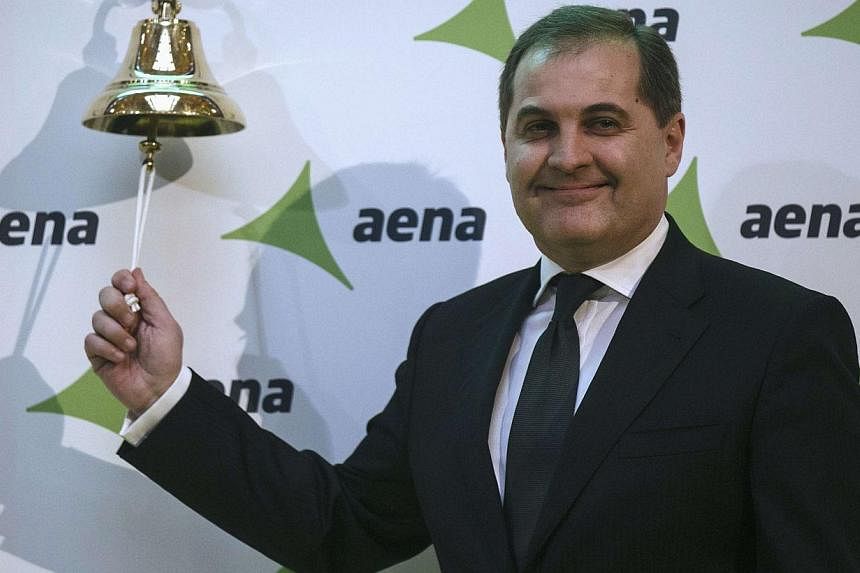MADRID (AFP) - Shares in the world's biggest airport operator, Spain's AENA, soared 20.7 per cent on their first day of trading Wednesday, a fresh sign of a investor appetite for Spanish assets as the nation returns to growth.
AENA's initial public offering was five times overscubscribed and its shares closed at €70, up from the issue price of €58, after hitting a high of €70.14.
"The company generates very strong investor interest," AENA executive chairman Jose Manuel Vargas said after he rang a bell at Madrid's stock market to kick off Europe's largest initial public offering since 2011.
It was also the first major listing in Spain since lender Bankia's troubled flotation in 2011 which ended with the bank needing a massive bailout from the central government and the European Union.
But since then the Spanish economy, the euro zone's fourth largest, has rebounded from five years of recession or stagnation following the collapse of a building boom in 2008 with 1.4 per cent growth last year, and investors have begun to return to the country.
Mexican billionaire Carlos Slim last year became the biggest shareholder in Spanish infrastructure group FCC in one of the most high profile signs of the improved investor sentiment for Spain.
Strong investor interest allowed AENA on Tuesday to set the price for its shares in the flotation at the very top of the range of the €53-58 a share, which valued the firm at €8.7 billion (S$13.3 billion).
The company runs 46 airports and two heliports in Spain and another 15 in Latin America, the United States and Europe, including London's Luton.
It handled nearly 196 million passengers last year, a 4.5 per cent increase over 2013, making it the world's biggest airport operator by passenger numbers, ahead of Germany's Fraport and France's ADP.
RETURN TO GROWTH
Hit hard by Spain's economic downturn, the operator underwent a massive overhaul which included cutting jobs and hiking airport fees that have helped restore it back to financial health.
The company reported a net profit of €596.7 million for 2013, emerging from a net loss of €63.5 million the previous year.
Results for 2014 are not yet available, but AENA said its revenues rose 6.4 per cent during the first nine months to €2.39 billion thanks to a rise in airport traffic as Spain's economy picked up and stronger sales from duty free shops.
Spain, which is privatising the company as it tries to lower a public debt load that is expected to surpass 100 per cent of gross domestic product this year, plans to keep a 51 per cent controlling stake in the operator.
"AENA will continue to be a public firm," Public Works Minister Ana Pastor said on the eve of the listing.
AENA fixed the size of the offering at 44.55 per cent of its capital, an amount that can be raised to 49 per cent if an over-allotment option is exercised, which would raise over €4 billion for the state.
In January 2012, Spain's new conservative government shelved plans to partially privatise AENA until November 2014 due to tepid investor interest.
The original initial price offering plan set a price range of between €41.50-53.30 a share but it was lifted twice since due to the company's improved results and a recovery in investor sentiment towards Spain.
The Spanish government had envisaged the sale of 21 per cent of the operator's shares to three anchor investors - British hedge fund TCI, Spanish infrastructure group Ferrovial and Spanish fund Grupo Alba.
But the three firms had offered a lower price and the increase in AENA's valuation edged the first two out of the operation.
TCI and billionaire financier George Soros bought shares in the flotation, according to Spanish business daily Expansion.
The majority of the offer, 95 per cent, was reserved for institutional investors with the rest set aside for retail investors.

